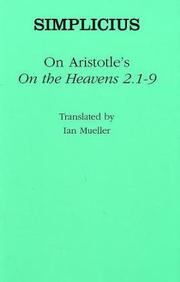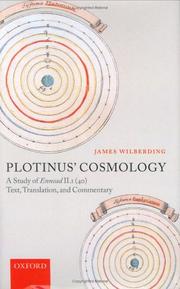| Listing 1 - 10 of 51 | << page >> |
Sort by
|
Book
ISBN: 1108542719 1108529089 1108423647 1108540015 1108438229 Year: 2019 Publisher: Cambridge : Cambridge University Press,
Abstract | Keywords | Export | Availability | Bookmark
 Loading...
Loading...Choose an application
- Reference Manager
- EndNote
- RefWorks (Direct export to RefWorks)
How did the ancient Greeks and Romans conceptualise order? This book answers that question by analysing the formative concept of kosmos ('order', 'arrangement', 'ornament') in ancient literature, philosophy, science, art, and religion. This concept encouraged the Greeks and Romans to develop theories to explain core aspects of human life, including nature, beauty, society, politics, the individual, and what lies beyond human experience. Hence, Greek kosmos, and its Latin correlate mundus, are subjects of profound reflection by a wide range of important ancient figures, including philosophers (Parmenides, Empedocles, the Pythagoreans, Democritus, Plato, Aristotle, the Stoics, Lucretius, Cicero, Seneca, Plotinus), poets and playwrights (Sophocles, Euripides, Aristophanes, Plautus, Marcus Argentarius, Nonnus), intellectuals (Gorgias, Protagoras, Varro), and religious exegetes (Philo, the Gospel Writers, Paul). By revealing kosmos in its many ancient manifestations, this book asks us to rethink our own sense of 'order', and to reflect on our place within a broader cosmic history.
Book
ISBN: 9783465037309 Year: 2012 Volume: 105 Publisher: Frankfurt am Main Klostermann
Abstract | Keywords | Export | Availability | Bookmark
 Loading...
Loading...Choose an application
- Reference Manager
- EndNote
- RefWorks (Direct export to RefWorks)
Book
ISBN: 1108883176 110887696X 1108834787 1108890245 Year: 2020 Publisher: Cambridge : Cambridge University Press,
Abstract | Keywords | Export | Availability | Bookmark
 Loading...
Loading...Choose an application
- Reference Manager
- EndNote
- RefWorks (Direct export to RefWorks)
De mundo is a protreptic to philosophy in the form of a letter to Alexander the Great and is traditionally ascribed to Aristotle. It offers a unique view of the cosmos, God and their relationship, which was inspired by Aristotle but written by a later author. The author provides an outline of cosmology, geography and meteorology, only to argue that a full understanding of the cosmos cannot be achieved without a proper grasp of God as its ultimate cause. To ensure such a grasp, the author provides a series of twelve carefully chosen interlocking analogies, building a complex picture in the reader's mind. The work develops a distinctly Aristotelian picture of God and the cosmos while paying tribute to pre-Aristotelian philosophers and avoiding open criticism of rival schools of philosophy. De mundo exercised considerable influence in late antiquity and then in the Renaissance and Early Modern times.

ISBN: 0801441021 Year: 2004 Publisher: Ithaca, N.Y. Cornell University Press
Abstract | Keywords | Export | Availability | Bookmark
 Loading...
Loading...Choose an application
- Reference Manager
- EndNote
- RefWorks (Direct export to RefWorks)
Cosmology, Ancient --- Cosmology --- Ancient cosmology --- Aristotle. --- Philosophy of nature --- Aristotle

ISBN: 3039106597 9783039106592 Year: 2006 Volume: 5 Publisher: Bern Lang
Abstract | Keywords | Export | Availability | Bookmark
 Loading...
Loading...Choose an application
- Reference Manager
- EndNote
- RefWorks (Direct export to RefWorks)
Cosmology, Ancient --- Ancient cosmology --- Empedocles --- Empédocle --- Empedokles --- Criticism and interpretation. --- Cosmology, Ancient. --- Cosmologie antique --- Acqui 2006

ISBN: 0521333288 0521034973 0511552548 9780521333283 9780511552540 9780521034975 Year: 1989 Publisher: Cambridge Cambridge University Press
Abstract | Keywords | Export | Availability | Bookmark
 Loading...
Loading...Choose an application
- Reference Manager
- EndNote
- RefWorks (Direct export to RefWorks)
This first volume takes the story from its beginnings in Ionian philosophy as far as the formation of the Atomic Theory and the first criticisms of it by Plato and Aristotle. The second volume will describe the cosmology of Plato and Aristotle, the attempt by Epicurean opponents to revive Atomism and later developments of the debate in classical philosophy and science up to the sixth century of our era. Both are accessible to anyone interested in the history of science and philosophy, even if they have no specialized knowledge of Greek philosophy and no Greek; but professional scholars too will find much of importance to them.
Cosmology, Ancient --- Cosmologie antique --- Ancient cosmology --- Philosophy of nature --- Antiquity --- Cosmology, Ancient. --- Arts and Humanities --- History
Book
ISBN: 1443845388 9781443845380 1443840181 9781443840187 Year: 2012 Publisher: Newcastle upon Tyne : Cambridge Scholars,
Abstract | Keywords | Export | Availability | Bookmark
 Loading...
Loading...Choose an application
- Reference Manager
- EndNote
- RefWorks (Direct export to RefWorks)
Homer provides an enormous challenge to the student; the potentialities of these lengthy texts are legion and the scholarship vast. The author has relied upon her knowledge of symbolic discourse to make a fresh study of the Odyssey, prioritising early neighbouring religions, their mythology, and shamanic practice. The latter has yielded particularly rich material concerning the axis of the world (axis mundi) as a route to the stars and the world of the gods. Man's shared experience of the nig...
Odysseus (Greek mythology) in literature. --- Cosmology, Ancient, in literature. --- Cosmology, Ancient. --- Ancient cosmology --- Odysseus, --- In literature.
Book
ISBN: 1472552237 1472501705 9781472501707 9780715640630 0715640631 9781472552235 9781472500861 1472500865 Year: 2011 Publisher: London Bristol Classical Press
Abstract | Keywords | Export | Availability | Bookmark
 Loading...
Loading...Choose an application
- Reference Manager
- EndNote
- RefWorks (Direct export to RefWorks)
"This is the first English translation of Simplicius "responses to Philoponus" Against Aristotle on the Eternity of the World. The commentary is published in two volumes: Ian Mueller's previous book in the series, Simplicius: On Aristotle On the Heavens 1.2-3, and this book on 1.3-4. Philoponus, the Christian, had argued that Aristotle' arguments do not succeed. For all they show to the contrary, Christianity may be right that the heavens were brought into existence by the only divine being and one moment in time, and will cease to exist at some future moment. Simplicius upholds the pagan view that the heavens are eternal and divine, and argues that their eternity is shown by their astronomical movements coupled with certain principles of Aristotle. Until the launch of this series, the 15,000 volumes of the ancient Greek commentators on Aristotle constituted the largest corpus of Greek philosophical writings which had not been translated into English or other European languages. There are now over 100 volumes in the series."--Bloomsbury Publishing This is the first English translation of Simplicius' responses to Philoponus' Against Aristotle on the Eternity of the World. The commentary is published in two volumes: Ian Mueller's previous book in the series, Simplicius: On Aristotle On the Heavens 1.2-3, and this book on 1.3-4. Philoponus, the Christian, had argued that Aristotle's arguments do not succeed. For all they show to the contrary, Christianity may be right that the heavens were brought into existence by the only divine being and one moment in time, and will cease to exist at some future moment. Simplicius upholds the pagan view that the heavens are eternal and divine, and argues that their eternity is shown by their astronomical movements coupled with certain principles of Aristotle. The English translation in this volume is accompanied by a detailed introduction, extensive commentary notes and a bibliography.
Astronomy, Ancient. --- Cosmology, Ancient. --- Astronomy, Greek --- Cosmology --- Greek astronomy --- Ancient cosmology --- Ancient astronomy --- Aristotle.
Book
ISBN: 0814202535 9780814202531 Year: 1977 Publisher: Columbus (OH) : Ohio State University Press,
Abstract | Keywords | Export | Availability | Bookmark
 Loading...
Loading...Choose an application
- Reference Manager
- EndNote
- RefWorks (Direct export to RefWorks)
Stoics --- Cosmology, Ancient --- Stoïcisme --- Cosmologie antique --- Ethics --- Philosophy, Ancient --- Ancient cosmology --- Stoïcisme --- Stoiciens --- Cosmologie --- Histoire --- Antiquite

ISBN: 0199277265 9780199277261 Year: 2006 Publisher: Oxford Oxford university press
Abstract | Keywords | Export | Availability | Bookmark
 Loading...
Loading...Choose an application
- Reference Manager
- EndNote
- RefWorks (Direct export to RefWorks)
In Ennead II.1 (40) Plotinus is primarily concerned to argue for the everlastingness of the universe, the heavens, and the heavenly bodies as individual substances. Here he must grapple both with the philosophical issue of personal identity through time and with the rich tradition of cosmology which pitted the Platonists against the Aristotelians and Stoics. What results is a historically informed cosmological sketch explaining the constitution of the heavens as well as sublunar and celestial motion. This book contains an extensive introduction aimed at providing the necessary background in Platonic, Aristotelian, and Stoic cosmology, the text itself, and a line-by-line commentary designed to elucidate its philosophical, philological and historical details.
Cosmology, Ancient. --- Cosmology --- Cosmologie antique --- Cosmologie --- Early works to 1800 --- Ouvrages avant 1800 --- Plotinus. --- Cosmology, Ancient --- Ancient cosmology
| Listing 1 - 10 of 51 | << page >> |
Sort by
|

 Search
Search Feedback
Feedback About UniCat
About UniCat  Help
Help News
News